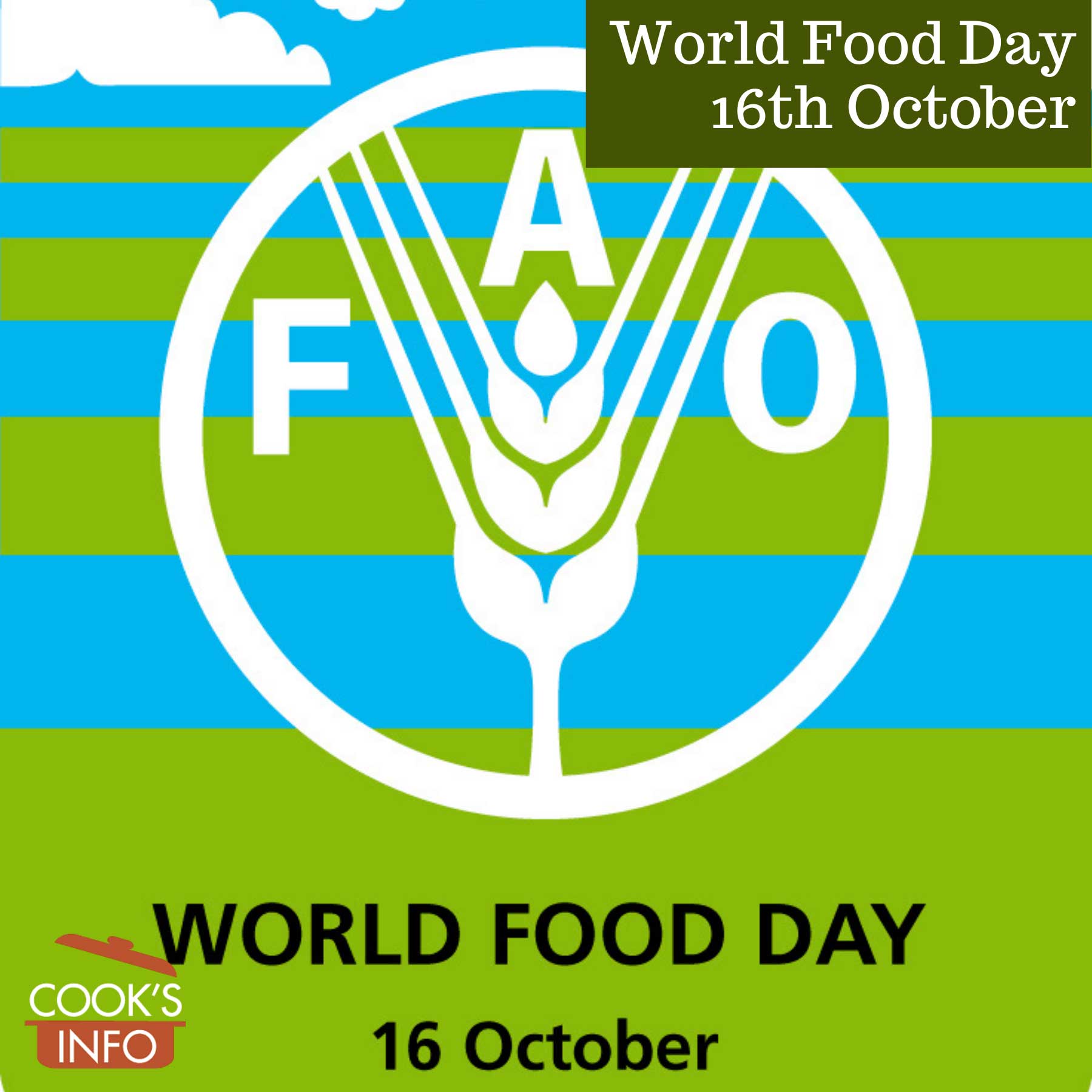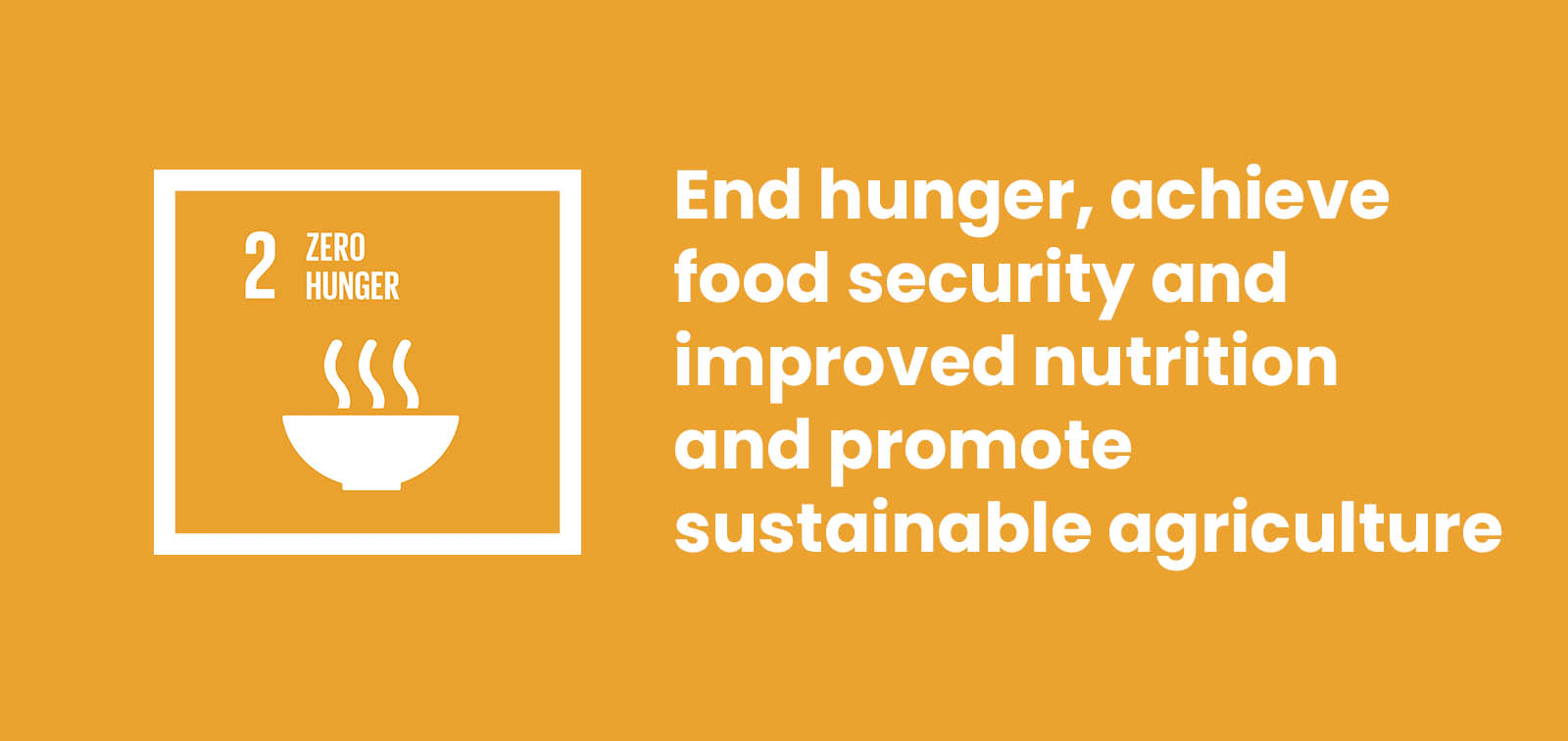
World Food Day Logo
The 16th of October is World Food Day, sponsored by the Food and Agriculture Organization (FAO) of the United Nations. On this day, efforts centre on ending hunger and promoting the many aspects of food security.
The United Nations has set seventeen Sustainable Development Goals (SDGs). Today ties in with many of them, but particularly Goal #2, which is Zero Hunger, whose ambitious goal is to ensure that “all people – especially children – have sufficient and nutritious food all year.”
The world suffers from malnutrition, which takes two forms: undernutrition, and overnutrition (i.e. obesity!) Yes, both count as malnutrition! And what both instances typically have in common is a lack of correct micronutrients in both cases.
Part of our current challenge is that farming, and food systems, around the world are geared to delivering wildly-profitable bulk crops, such as oils and carbohydrates, and cheap, easy food based on those, rather than delivering in an accessible, affordable fashion the micronutrients people also need.
Another challenge is food waste. Up to one-third of the food produced is lost or wasted at some point from harvest to consumer’s kitchen.
Many feel that a Farm to Fork Strategy is part of an answer. It would ensure a correlation between what is produced and what is needed with regards to nutrition and food security, and focus more tightly on ensuring that what is produced on the farm actually arrives on the plate, with minimal food loss or waste in between. It would also allow traceability, to help reduce and control food fraud, which is a threat to food security.
Food safety is also a large part of food security. Food which is not safe, is not food.
An additional underlying issue in world food is that in many instances and cultures women, who do a great deal of the work in food growing and preparation, and who are typically held ultimately responsible for the nourishment of families, aren’t allowed by men to have any voice in the decision-making process about what actually should be grown and raised, so there’s a disconnect of the people who actually know what’s needed right at the very start of the process. Floating women to the top of the decision-making process is going to be a key element in reaching sustainable, desirable long-term food solutions for the world.
Many people are now saying that part of the world’s hunger problem is not one of supply, but distribution. Facebook these days is flooded with heart-rending money appeals for dog rescues and GOFUNDMEs for pet surgeries. It’s as though the First World thinks the problem of world hunger has been solved. Charitable causes are of course not a zero sum game, but, the Global Report on Food Crisis (2020) [1]Accessed September 2021 at https://www.wfp.org/publications/2020-global-report-food-crises estimated that 75 million children were stunted and 17 million were suffering from acute wasting simply because of food insecurity, while in the First World, we are literally opening organic, GMO-free, gluten-free dog food delicatessens. This is a conversation that the First World needs to have with itself because history may not judge us kindly on this.
#WorldFoodDay #FoodHeroes #ZeroHunger
Website: World Food Day (link valid as of January 2021)
Facebook: https://www.facebook.com/WorldFoodDayUsaAndCanada/
See also: International Day of Awareness of Food Loss and Waste, World Water Day, World Food Safety Day
Food insecurity
A definition of food security was agreed upon at the World Food Summit in 1996:
“Food security, at the individual, household, national, regional, and global levels is achieved when all people at all times have physical and economic access to sufficient, safe, and nutritious food that meets their dietary needs and food preferences for an active and healthy life.”
The Institute for Global Food Security at Queen’s University, Belfast, says:
“Food insecurity is the state of being without reliable access to a sufficient quantity of affordable, nutritious food… According to the United Nations Food and Agriculture Organization, more than 820 million people across the globe are under nourished and suffering from hunger and more than 151 million children under 5 are stunted because of lack of proper nutrition. Hunger and malnutrition continue to be an issue due to pressure from stressors such as population growth, income growth, economic resources, conflict and war, inequality, the refugee crisis, epidemics and climatic conditions.” [2]Elliot, Christopher. Queen’s University Belfast. In: Understanding Food Supply Chains. Module 2, Step 2.6. July 2020. Accessed July 2020 at https://www.futurelearn.com/courses/understanding-food-supply-chains
History
Promotion of World Food Day started in 1979. In 1981, organizers began assigning a different theme to each year. The Wikipedia entry for World Food Day lists the various themes that there have been to date. The very first theme was “Food comes first”.
The 16th of October was chosen because it is the day that the FAO was founded in 1945. The FAO’s headquarters are in Rome, Italy, right across from the Circus Maximus, and consequently one of their operational languages is Italian.
Past themes
- 2021 — Safe food now for a healthy tomorrow
- 2020 — Grow, Nourish, Sustain. Together
- 2019 — Our Actions Are Our Future, Healthy Diets for A #ZeroHunger World
- 2018 — Our Actions Are Our Future, Ending World Hunger by 2030 is Possible
- 2017 — Change the future of migration. Invest in food security and rural development
- 2016 — Climate change — Climate is changing. Food and agriculture must too
- 2015 — Social Protection and Agriculture — Breaking the Cycle of Rural Poverty
- 2014 — Family Farming — Feeding the world, caring for the earth”
- 2013 — Sustainable Food Systems for Food Security and Nutrition
- 2012 — Agricultural cooperatives – key to feeding the world
- 2011 — Food prices – from crisis to stability
- 2010 — United against hunger
- 2009 — Achieving food security in times of crisis
- 2008 — World food security — the challenges of climate change and bioenergy
- 2007 — The right to food
- 2006 — Investing in agriculture for food security
- 2005 — Agriculture and intercultural dialogue
- 2004 — Biodiversity for food security
- 2003 — Working together for an international alliance against hunger
- 2002 — Water — source of food security
- 2001 — Fight hunger to reduce poverty
- 2000 — A millennium free from hunger
- 1999 — Youth against hunger
- 1998 — Women feed the world
- 1997 — Investing in food security
- 1996 — Fighting hunger and malnutrition
- 1995 — Food for all
- 1994 — Water for life
- 1993 — Harvesting nature’s diversity
- 1992 — Food and nutrition
- 1991 — Trees for life
- 1990 — Food for the future
- 1989 — Food and the environment
- 1988 — Rural youth
- 1987 — Small farmers
- 1986 — Fishermen and fishing communities
- 1985 — Rural poverty
- 1984 — Women in agriculture
- 1983 — Food security
- 1982 — Food comes first
- 1981 — Food comes first
Video for the 2020 campaign:
Sources
Appel, Deirdre. 7 Ways to Celebrate World Food Day. Hunter College New York City Food Policy Center. 14 October 2020. Accessed September 2021 at https://www.nycfoodpolicy.org/7-ways-to-celebrate-world-food-day-on-friday-october-16th/
Grover, Neha. World Food Day 2020: Date, Theme, History And Significance Of The Special Global Event. New Delhi, India: New Delhi Television Ltd. 15 October 2020. Accessed September 2021 at https://food.ndtv.com/news/world-food-day-2020-date-theme-history-and-significance-of-the-special-global-event-2310662
Merrigan, Kathleen. Celebrating World Food Day. Arizona State University Global Institute of Sustainability and Innovation. 16 October 2018. Accessed September 2021 at https://sustainability-innovation.asu.edu/news/archive/celebrating-world-food-day/
Stroumboulopoulos, George. Here’s How Canada Is Marking World Food Day Today. Canadian Broadcasting Corporation. 16 October 2013. Accessed September 2021 at https://www.cbc.ca/strombo/news/heres-how-canada-is-marking-world-food-day-today
World Food Day 2021: Theme, Day, History and Significance | Everything a foodie must know about this day. New Delhi, India: India Today. 20 September 2021. Accessed September 2021 at https://www.indiatoday.in/information/story/world-food-day-2021-theme-day-history-and-significance-everything-a-foodie-must-know-about-this-day-1854741-2021-09-20
World Food Day: Food for thought to build back better. European Union External Action Service. 16 October 2020. Accessed September 2021 at https://eeas.europa.eu/headquarters/headquarters-homepage/87069/world-food-day-food-thought-build-back-better_en
References
| ↑1 | Accessed September 2021 at https://www.wfp.org/publications/2020-global-report-food-crises |
|---|---|
| ↑2 | Elliot, Christopher. Queen’s University Belfast. In: Understanding Food Supply Chains. Module 2, Step 2.6. July 2020. Accessed July 2020 at https://www.futurelearn.com/courses/understanding-food-supply-chains |


